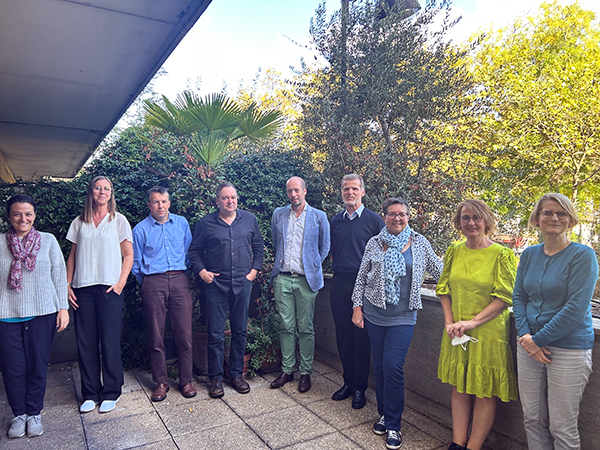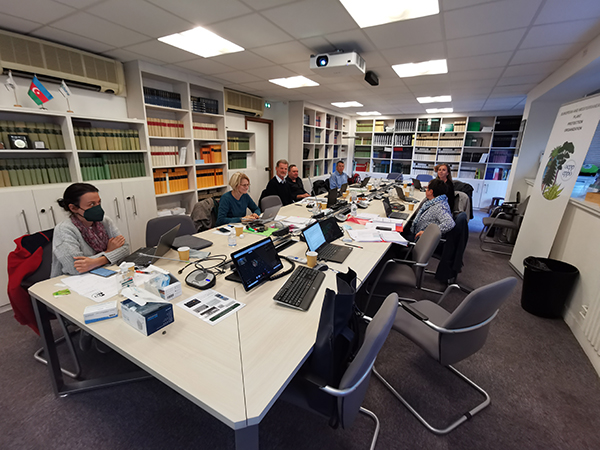
68th Meeting of the Panel on Phytosanitary Measures
Paris, 2022-10-05/07
The Panel met on 2022-10-05/07 at the EPPO Headquarters (Paris). The main task of this Panel is to evaluate risks presented by specific pests and design phytosanitary measures to avoid their introduction and spread. The Panel had a joint session with the EPPO Panel on Quarantine Pests for Forestry to discuss issues of interest for both groups: in particular, this included the drafting of Guidelines for expert working groups (EWGs) and Panels when recommending risk management measures for forest pests and links between Standards in the series PM 8 Commodity-specific phytosanitary measures and pest risk analyses (PRAs). The Panel on Quarantine Pests for Forestry will further investigate how PM 8 Standards are used by member countries.

Pest Risk Analysis
Recommendations for regulation by EPPO are made either based on EPPO PRAs or non-EPPO PRA reports. During the Panel, the following national/EU PRAs were discussed:
- Dutch assessment on American Spodoptera species
 : The PRA report for Spodoptera ornithogalli and S. praefica (Lepidoptera: Noctuidae) was reviewed by the Panel. It will be presented to the Working Party with the objective to recommend the addition of both pests to the EPPO A1 List of pests recommended for regulation.
: The PRA report for Spodoptera ornithogalli and S. praefica (Lepidoptera: Noctuidae) was reviewed by the Panel. It will be presented to the Working Party with the objective to recommend the addition of both pests to the EPPO A1 List of pests recommended for regulation. - Slovenian PRA on Meloidogyne luci and M. ethiopica: The PRA report was reviewed during the meeting. Additional experts will be consulted.
- Italian PRA on Meloidogyne graminicola
 : The PRA report was reviewed during the meeting. Additional experts will be consulted, and additional information will be collected on the host crops rotated with rice in the EPPO region. This will allow the risk for the nematode transfer to rice production to be more clearly identified.
: The PRA report was reviewed during the meeting. Additional experts will be consulted, and additional information will be collected on the host crops rotated with rice in the EPPO region. This will allow the risk for the nematode transfer to rice production to be more clearly identified. - EFSA pest categorization on Arboridia kakogawana
 (Hemiptera: Cicadellidae): A review of the pest categorization was presented. It was recommended that additional information on whether official measures are applied in the EPPO countries where the pest is present should be collected, and to wait for the outcome of ongoing discussions at EU level on possible regulation, before concluding whether a PRA report should be prepared.
(Hemiptera: Cicadellidae): A review of the pest categorization was presented. It was recommended that additional information on whether official measures are applied in the EPPO countries where the pest is present should be collected, and to wait for the outcome of ongoing discussions at EU level on possible regulation, before concluding whether a PRA report should be prepared. - EFSA pest categorization
 , United Kingdom PRA
, United Kingdom PRA  & previous discussions on the Italian PRA for Crisicoccus pini (Hemiptera: Pseudococcidae): After a review of all these documents, the Panel decided that the additional information provided on economic impact in China justifies the preparation of a PRA report.
& previous discussions on the Italian PRA for Crisicoccus pini (Hemiptera: Pseudococcidae): After a review of all these documents, the Panel decided that the additional information provided on economic impact in China justifies the preparation of a PRA report.

The Panel noted that important pests for minor crops, or pests of interest for more limited areas in the region are sometimes not selected for PRA and that this may be linked to the current selection process. The Panel brainstormed on how this could be improved and made practical recommendations. In addition, in recent years, an increasing number of non-EPPO PRAs are performed in the region. The Panel considered that a prioritization process for the review of non-EPPO PRAs was needed. The Panel also discussed the need for training in PRA and considered that allowing experts to attend EPPO PRA EWGs as observers was sufficient for the moment.
Risk management measures
Based on the experience gathered with M. luci, M. ethiopica and M. graminicola, the document Guidance for expert working groups for PRA and Panels on risk management measures for Meloidogyne species will be revised and presented again for information to the Working Party in 2023.
As recommended by the Working Party in 2022-06, the Panel discussed the need to update information and revise Standards on M. chitwoodi and M. fallax, but concluded that the discussion should take place based on the outcome of the Melo-Survey Euphresco Project ![]() which just started.
which just started.
The Panel was updated about the beech leaf disease which is associated with the foliar nematode Litylenchus crenatae mccannii. It was decided that a pest risk management report could be drafted.
Update on projects
An update on Euphresco ![]() projects of interest for the Panel was given, to promote interactions and partnerships (phytophthoras
projects of interest for the Panel was given, to promote interactions and partnerships (phytophthoras ![]() in horticulture, treatment of wood products with ethane dinitrile (EDN)
in horticulture, treatment of wood products with ethane dinitrile (EDN) ![]() ) or to report outcomes (Phytosanitary risks of newly introduced crops
) or to report outcomes (Phytosanitary risks of newly introduced crops ![]() ). In particular, the Panel was made aware of the need for more governmental partnership for the development of validated procedures and data for phytosanitary treatment of wood products using EDN.
). In particular, the Panel was made aware of the need for more governmental partnership for the development of validated procedures and data for phytosanitary treatment of wood products using EDN.
The next Panel meeting is planned on 2023-03-07/09 at the EPPO Headquarters in Paris (but may be subject to modification).
